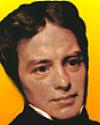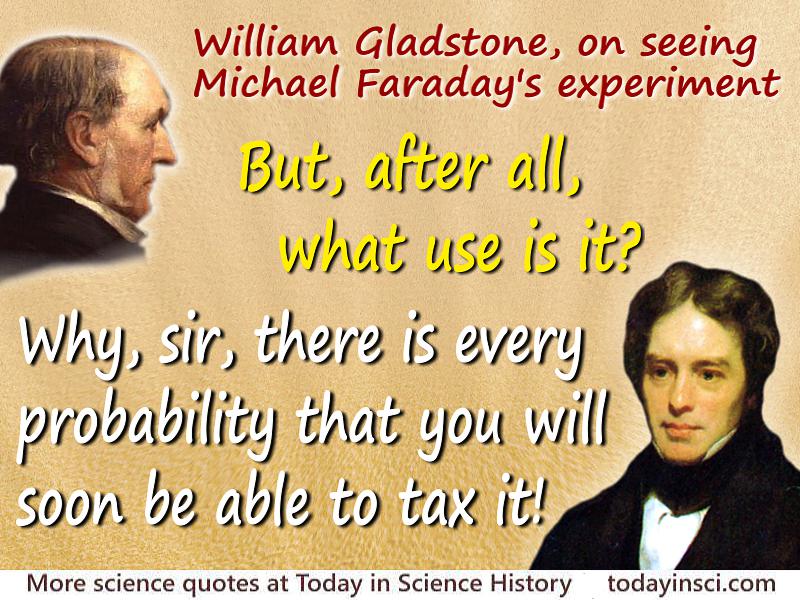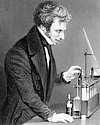 (source)
(source)
|
Michael Faraday
(22 Sep 1791 - 25 Aug 1867)
English physicist and chemist who was a great experimentalist. His major contributions included the early understanding of electromagnetism.
|
Michael Faraday - You will soon be able to tax it!
Illustrated Quote - Large (800 x 600 px)
More Michael Faraday quotes on science >>
This is how the quote in given by W.E.H. Lecky in the Introduction to the 1899 edition of his book, Democracy and Liberty. Lecky gives much biographical material about Sir William Gladstone (1809-1898), who became the British Chancellor of the Exchequer, responsible for the national budget. He presented his first budget in Apr 1853, with its expenditures and taxes. Later, because of the increasing cost of fighting the Crimean War, Gladstone increased the income tax rate from 7% to 10½%.
Although Gladstone was diligent in matters concerned with his work, Lecky contrasts that, “There were, it is true, wide tracts of knowledge with which he had no sympathy. The whole great field of modern scientific discovery seemed out of his range.” To illustrate this, Lecky continues:
An intimate friend of Faraday once described to me how, when Faraday was endeavouring to explain to Gladstone and several others an important new discovery in science Gladstone’s only commentary was ‘but, after all, what use is it?” ‘Why, sir,’ replied Faraday, ‘there is every probability that you will soon be able to tax it!’”
Thus, one should note that although Lecky used quotation marks, the words are given as a recollection, written third-hand, some time after the original conversation between Gladstone and Faraday.
Also, Lecky did not specify which “new discovery.” Yet in later retellings it is given as electricity. So note this was not specified in the original text, and, unless there is another source of which Webmaster is not aware, it would be an assumption when recent quote collections refer to electricity. Of course, Faraday's major investigations involved electricity and electromagnetism, so the implication is not unreasonable.
There are no extant writings of Faraday himself, nor his contemporaries, on this matter, so the authenticity of the quote can only be judged from the context given above, a third-hand account. For this reason, it could be labelled as possibly apocryphal.1
Among the various wordings and citations of the quote in recent publications, Faraday is asked by the “Prime Minister.” It is true that Gladstone held that office four times, the first in 1868, the year after Faraday's death. Some writers take that conflict of timing as evidence that the conversation could not have been taken place.2 However Lecky’s account does not refer to Gladstone as being Prime Minister at the time. Which leaves Lecky’s statement of the quote as being possible, since Gladstone was Chancellor of the Exchequer during Faraday’s lifetime.
2 For example, David Bodanis, E=mc²: A Biography of the World's Most Famous Equation (2000), 240. (source)
- Science Quotes by Michael Faraday.
- 22 Sep - short biography, births, deaths and events on date of Faraday's birth.
- Michael Faraday - Light-House Illumination - The Electric Light
- Michael Faraday - context of quote “You will soon be able to tax it!” - Medium image (500 x 350 px)
- Large color picture of Michael Faraday (800 x 1000 px)
- Michael Faraday - context of quote “Always cross-question an assertion” - Medium image (500 x 350 px)
- Michael Faraday - context of quote “Always cross-question an assertion” - Large image (800 x 600 px)
- Michael Faraday - context of quote “I am jealous of the term atom” - Medium image (500 x 350 px)
- Michael Faraday - context of quote “I am jealous of the term atom” - Large image (800 x 600 px)
- Michael Faraday on Pollution of the River Thames - Letter to the Editor, The Times (7 July 1885).
- Michael Faraday - Scientific Worthy - article from Nature (1873)
- Michael Faraday, Christmas Lecturer - transcript of a 1940s radio talk by Charles F. Kettering.
- The Intangible in Human Progress - Michael Faraday mentioned in transcript of a 1940s radio talk by Charles F. Kettering.
- The Electric Life Of Michael Faraday, by Alan W. Hirshfeld. - book suggestion.
- Booklist for Michael Faraday.









